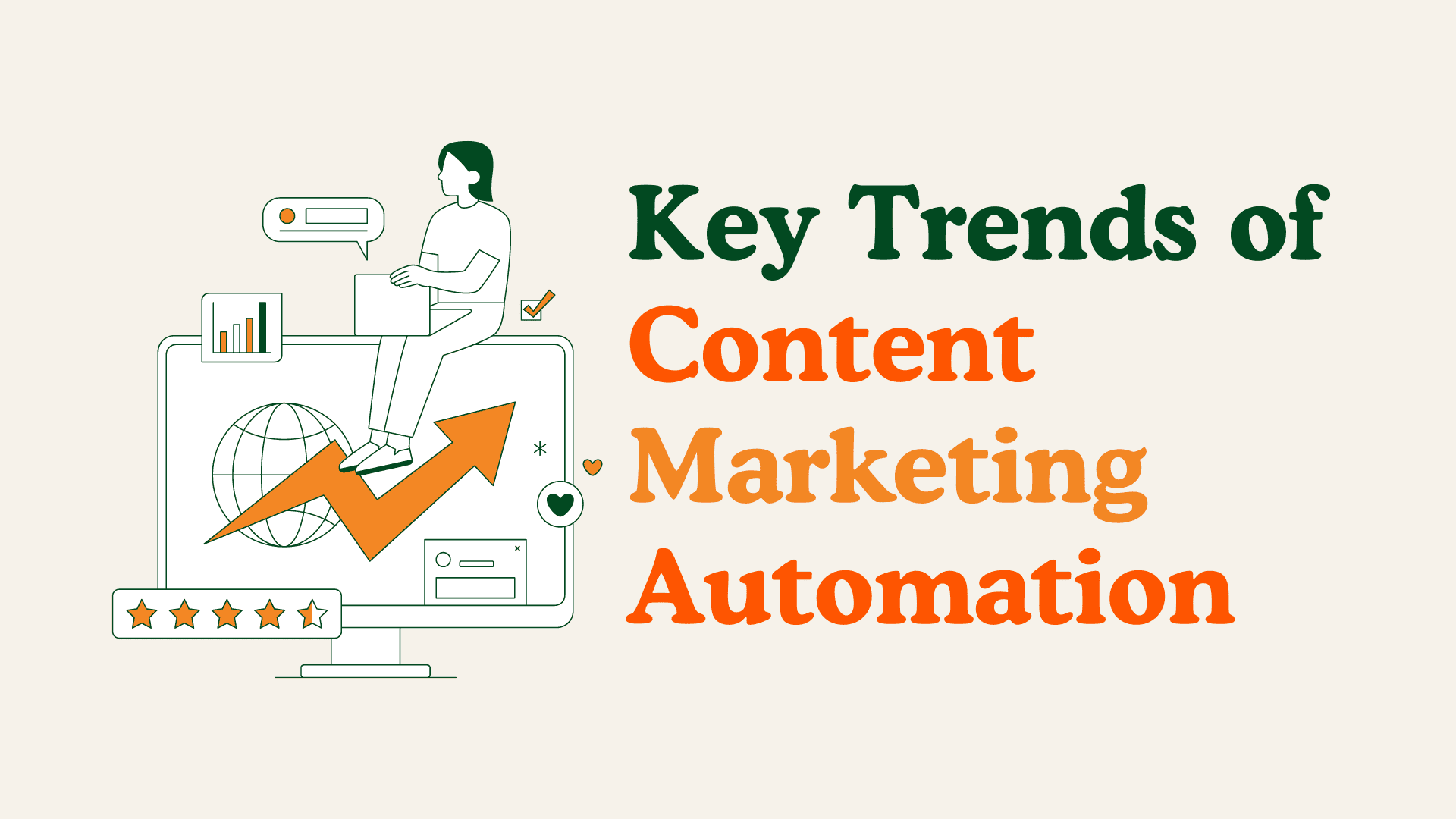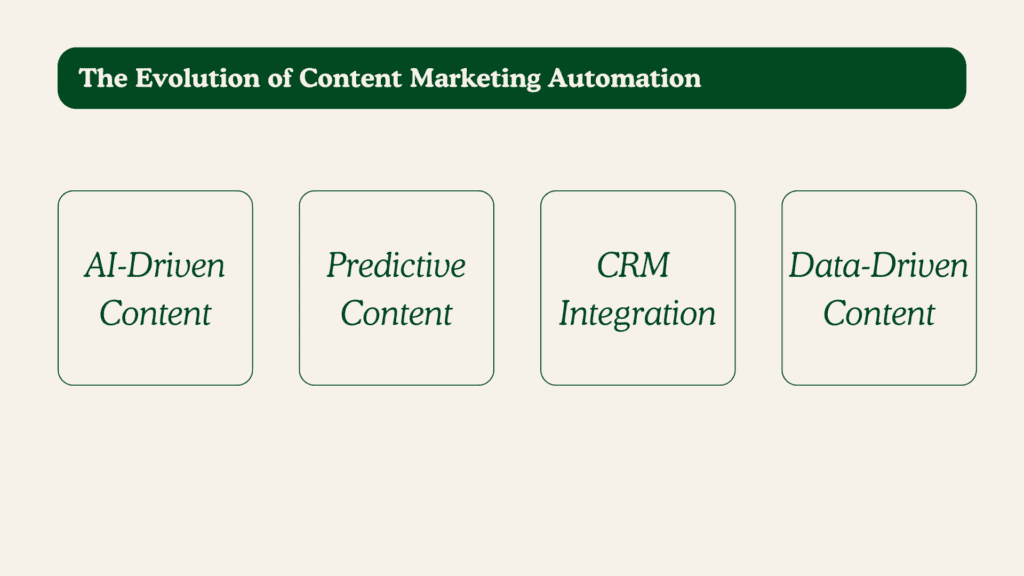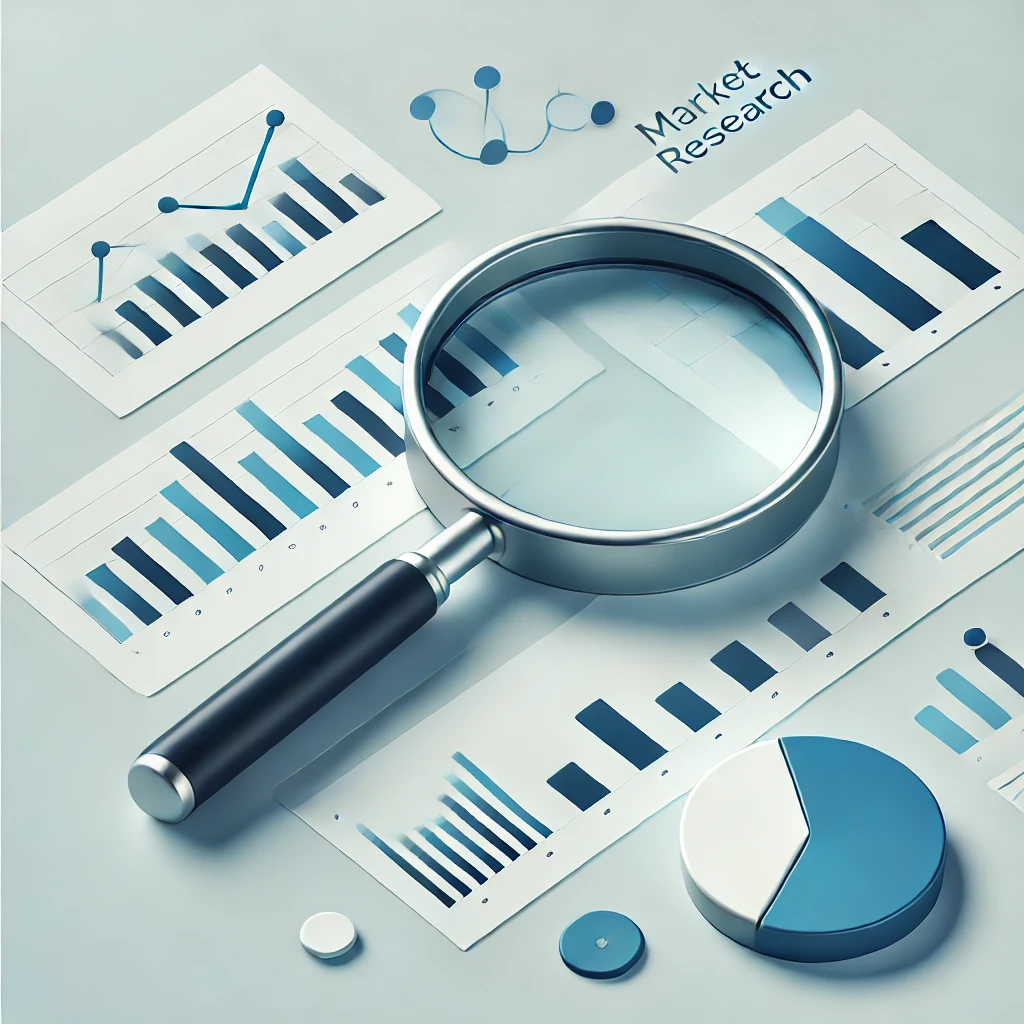
The future of content marketing automation is rapidly evolving, with market forecasts showing a potential growth of over 16% annually in the use of AI-driven tools. Discover unique insights, case studies, and the latest tools shaping this revolutionary field.
Table of Content
- The Evolution of Content Marketing Automation
- AI-Driven Content Creation: Trends and Tools
- Predictive Content Marketing: Anticipating Consumer Needs
- Automated Content Production: Benefits and Challenges
- Integrating Marketing Automation Tools with CRM Systems
- Data-Driven Content Marketing Automation Strategies
- Future Trends in Content Marketing Automation
The Evolution of Content Marketing Automation
The evolution of content marketing automation has dramatically transformed how businesses execute content strategies. Initially, marketers relied on manual content management, often cumbersome and time-consuming. As technology advanced, automated content creation emerged, revolutionizing the industry.
One of the early milestones was the introduction of basic marketing automation tools, which streamlined tasks like email scheduling and social media posting. These tools laid the groundwork for more sophisticated systems.
The integration of AI in content marketing marked a significant leap. AI-driven content marketing now enables marketers to handle complex tasks effortlessly— from content strategy automation to real-time data analytics. Predictive content marketing, fueled by AI, allows for more precise targeting, enhancing content personalization automation.
Content creation trends have evolved too. Today, automated content production is not just about efficiency; it’s about enhancing quality and relevance. AI algorithms analyze vast datasets, providing insights that help craft engaging and personalized content. This shift towards data-driven content marketing ensures that every piece of content resonates with the audience.
The future of marketing automation looks promising. As technology continues to evolve, so does the potential for more advanced content strategy automation. Marketers can now focus on creativity and strategy, while automation handles repetitive tasks.

AI-Driven Content Creation: Trends and Tools
AI-driven content creation is shaping the future of marketing automation. Current trends in AI-driven content marketing focus on content strategy automation and automated content creation. Marketing automation tools like Jasper and Copy.ai enhance content personalization automation, ensuring higher engagement.
Using these tools, brands can generate content that is relevant and engaging. The accuracy in AI-driven content marketing stems from algorithms analyzing vast datasets. This data-driven content marketing approach helps to tailor content precisely.
Automated content production also means that the quality of the content remains high. Tools such as MarketMuse optimize content for search engines, improving visibility and reach.
Case studies highlight how AI enhances campaigns. For instance, Adidas leveraged AI to generate personalized marketing messages during the World Cup. This resulted in a 45% increase in customer engagement.
The future of marketing automation involves more sophisticated digital marketing automation tools. These tools not only create content but also predict trends. Predictive content marketing is increasingly critical in foreseeing what will resonate with audiences.
The evolution of content marketing has shown that AI in content marketing significantly boosts efficiency. With marketing technology advancements, the scope of automated content will continue to expand.
Content creation trends are also leaning toward AI-driven insights. This direction ensures content is not only relevant but also timely. Automated marketing strategies like these are crucial for staying competitive.
Predictive Content Marketing: Anticipating Consumer Needs
Predictive content marketing leverages advanced AI-driven content marketing tools to collect and analyze data. These marketing automation tools sift through information such as browsing habits, purchasing history, and social media interactions to predict future behaviors. Brands can use these insights to create content that resonates with their audience, enhancing engagement and conversion rates.
For instance, by understanding peak browsing times, interests, and previous engagements, predictive analytics can suggest the optimal timing and type of content to deploy. This level of insight allows for content strategy automation that is both proactive and responsive, making the most out of each interaction with potential customers.
Real-world examples illustrate the power of predictive content marketing. Netflix, for example, uses predictive analytics to recommend shows and movies based on user history and preferences. Similarly, Amazon uses it to suggest products that consumers are likely to purchase. These strategies, relying heavily on automated content creation and personalization, have proven to significantly increase user engagement and sales.
Consequently, adopting predictive content marketing within the broader spectrum of content marketing automation is not just a trend, but a necessity. It stands as a pivotal shift in the evolution of content marketing, enabling brands to stay ahead in the competitive landscape of digital marketing automation.
As companies continue to harness the power of marketing technology advancements, content personalization automation will become increasingly sophisticated. Brands that can anticipate consumer needs will be better positioned to deliver relevant content, driving more meaningful interactions and higher conversion rates.
This seamless integration of predictive insights into content strategies showcases the future of content marketing automation, setting a new standard for how brands connect with their audiences.
Automated Content Production: Benefits and Challenges
Automated content production, a key aspect of content marketing automation, offers a variety of benefits but also presents notable challenges. One of the most significant advantages is scalability. Automated content creation allows brands to efficiently increase their content production without proportionally increasing their labor costs. This scalability is vital in the future of marketing automation, as brands need to continuously engage large audiences across various digital channels.
Cost efficiency is another major advantage. Automated content production significantly reduces the costs associated with hiring writers, editors, and other content creation staff. Utilizing marketing automation tools, AI-driven content marketing also speeds up content production processes. This rapid content delivery helps brands stay relevant in fast-paced digital landscapes, aligning with current content creation trends.
However, automated content production is not without its pitfalls. Maintaining content quality is a significant challenge. While AI can generate text, it often lacks the nuanced understanding required for high-quality, engaging content. Ensuring creativity and originality in automated content is also complex, as automated solutions may produce repetitive or generic material.
Compliance presents another obstacle. Automated systems must adhere to legal and regulatory standards, which can be difficult to embed into algorithms. Failure to comply can lead to legal issues and damage to brand reputation.
To address these concerns, many brands use hybrid strategies. Combining automated content production with human oversight helps maintain quality and creativity. Regular reviews and updates to the algorithms can ensure compliance with evolving regulations. Additionally, leveraging data-driven content marketing to refine and personalize content can enhance engagement and effectiveness.
Despite these challenges, the evolution of content marketing continues to advance. Content strategy automation, supported by marketing technology advancements, offers innovative solutions for automated content production.
Integrating Marketing Automation Tools with CRM Systems
Integrating marketing automation tools with CRM systems creates a powerful synergy that is revolutionizing content marketing automation. By merging these platforms, businesses can streamline marketing workflows, improve customer targeting, and enhance overall campaign effectiveness.
For instance, imagine a scenario where your CRM indicates a user frequently engages with blog posts about digital marketing automation. With integrated systems, marketing automation tools can automatically trigger the creation of personalized content focused on that topic, enhancing user engagement.
Marketing automation trends show that integrating CRM systems assists in developing sophisticated content strategy automation. It allows marketers to oversee the customer journey from a single interface, making the evolution of content marketing more cohesive. Marketers can set up automated workflows that initiate targeted campaigns at opportune moments, minimizing manual efforts and maximizing output.
An example of this synergy is seen in automated content production. When a CRM updates a contact’s preferences, it can signal marketing tools to craft tailored emails, blog posts, or social media content immediately. This process not only saves time but also ensures that content is always relevant and timely.
To achieve the best results, marketers should follow best practices such as regular data updates, ensuring CRM and marketing tools are compatible, and training staff on both platforms. This practice results in a seamless process that leverages content personalization automation to deliver high-quality, scalable, and data-driven content marketing.
Integrating CRM systems with marketing automation tools is a cornerstone in the future of marketing automation, driving efficiency and personalization.
Data-Driven Content Marketing Automation Strategies
The future of content marketing automation is inextricably linked with data-driven approaches. Data analytics are fundamental in shaping automated marketing strategies, guiding every aspect from content creation trends to content strategy automation.
By leveraging data intelligently, businesses can craft more effective and tailored content. Using marketing automation tools and AI-driven content marketing technologies, companies can gather detailed customer insights. These insights can then be converted into actionable steps, ensuring the evolution of content marketing remains dynamic and responsive.
To maximize the benefits of data-driven content marketing, consider the following tips:
- Collecting Data: Use advanced marketing automation tools to gather data from various touchpoints such as social media, email campaigns, and website interactions. Ensure data quality by regularly cleaning and updating datasets.
- Analyzing Data: Use AI and machine learning to process and interpret data. Look for patterns and trends that can inform your content strategy automation.
- Applying Data: Create segmented, personalized content that speaks directly to your audience’s needs and preferences. Automated content production can help streamline this process, ensuring consistency and efficiency.
With the right approach, data-driven content marketing can significantly enhance digital marketing automation efforts. The ability to predict customer preferences and deliver highly personalized experiences is setting new standards in content personalization automation.
As you integrate these strategies, remember that the landscape is continuously evolving. Stay updated on marketing technology advancements and be ready to adapt your practices. By doing so, you ensure that your content marketing automation remains robust, efficient, and primed for future challenges.
Future Trends in Content Marketing Automation
The future of marketing automation is inherently tied to the trajectory of content marketing automation. Emerging marketing technology advancements are increasingly shaping how content is created, disseminated, and personalized. AI-driven content marketing is transforming content strategy automation, making it possible to churn out high-quality, relevant content at unprecedented speeds.
We will see more integration of predictive content marketing approaches, where algorithms analyze historical data to forecast what type of content will perform best. This automated foresight enables marketers to create strategies that are not just reactive but proactive. AI in content marketing tools will also evolve to offer even deeper insights into consumer behavior, making automated content production more accurate and engaging.
Consumer expectations are shifting towards highly personalized experiences. Thus, content personalization automation will become even more significant. Advances in AI will make it easier to tailor content to individual preferences, increasing engagement and conversion rates. Innovations in digital marketing automation will facilitate more seamless cross-channel personalization, ensuring consistency and relevance across every consumer touchpoint.
Automated marketing strategies will not only encompass content creation but also distribution. Imagine marketing automation tools that automatically adjust your content dissemination strategy based on real-time data and trending content creation trends. Seamless execution will be integral to maintaining a competitive edge.
The evolution of content marketing signifies a move towards hyper-relevant, data-driven approaches. Automated systems will continuously analyze data, producing insights that inform content strategy automation at every step.
For marketers, staying ahead means adopting these emerging technologies and refining a data-driven content marketing approach. Leveraging AI-driven content marketing and predictive content marketing will not just enhance your strategies but also ensure they are future-proof. Preparing for these changes today will offer a significant advantage tomorrow.
Conclusions
Content marketing automation is set to revolutionize the marketing landscape, offering unprecedented efficiency and precision. Embrace these trends to stay ahead. For more in-depth resources and updates, subscribe to our newsletter.






